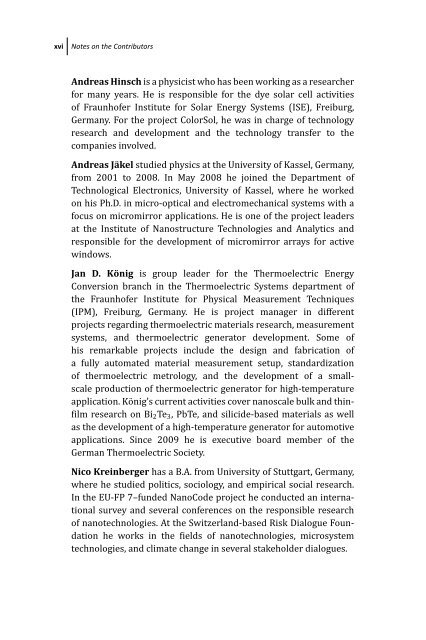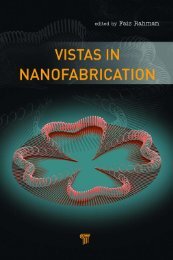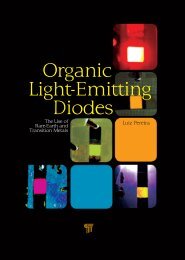Download PDF - Pan Stanford Publishing
Download PDF - Pan Stanford Publishing
Download PDF - Pan Stanford Publishing
You also want an ePaper? Increase the reach of your titles
YUMPU automatically turns print PDFs into web optimized ePapers that Google loves.
xvi<br />
Notes on the Contributors<br />
Andreas Hinsch is a physicist who has been working as a researcher<br />
for many years. He is responsible for the dye solar cell activities<br />
of Fraunhofer Institute for Solar Energy Systems (ISE), Freiburg,<br />
Germany. For the project ColorSol, he was in charge of technology<br />
research and development and the technology transfer to the<br />
companies involved.<br />
Andreas Jäkel studied physics at the University of Kassel, Germany,<br />
from 2001 to 2008. In May 2008 he joined the Department of<br />
Technological Electronics, University of Kassel, where he worked<br />
on his Ph.D. in micro-optical and electromechanical systems with a<br />
focus on micromirror applications. He is one of the project leaders<br />
at the Institute of Nanostructure Technologies and Analytics and<br />
responsible for the development of micromirror arrays for active<br />
windows.<br />
Jan D. König is group leader for the Thermoelectric Energy<br />
Conversion branch in the Thermoelectric Systems department of<br />
the Fraunhofer Institute for Physical Measurement Techniques<br />
(IPM), Freiburg, Germany. He is project manager in different<br />
projects regarding thermoelectric materials research, measurement<br />
systems, and thermoelectric generator development. Some of<br />
his remarkable projects include the design and fabrication of<br />
a fully automated material measurement setup, standardization<br />
of thermoelectric metrology, and the development of a smallscale<br />
production of thermoelectric generator for high-temperature<br />
application. König’s current activities cover nanoscale bulk and thinfilm<br />
research on Bi 2 Te 3 , PbTe, and silicide-based materials as well<br />
as the development of a high-temperature generator for automotive<br />
applications. Since 2009 he is executive board member of the<br />
German Thermoelectric Society.<br />
Nico Kreinberger has a B.A. from University of Stuttgart, Germany,<br />
where he studied politics, sociology, and empirical social research.<br />
In the EU-FP 7–funded NanoCode project he conducted an international<br />
survey and several conferences on the responsible research<br />
of nanotechnologies. At the Switzerland-based Risk Dialogue Foundation<br />
he works in the fields of nanotechnologies, microsystem<br />
technologies, and climate change in several stakeholder dialogues.

















